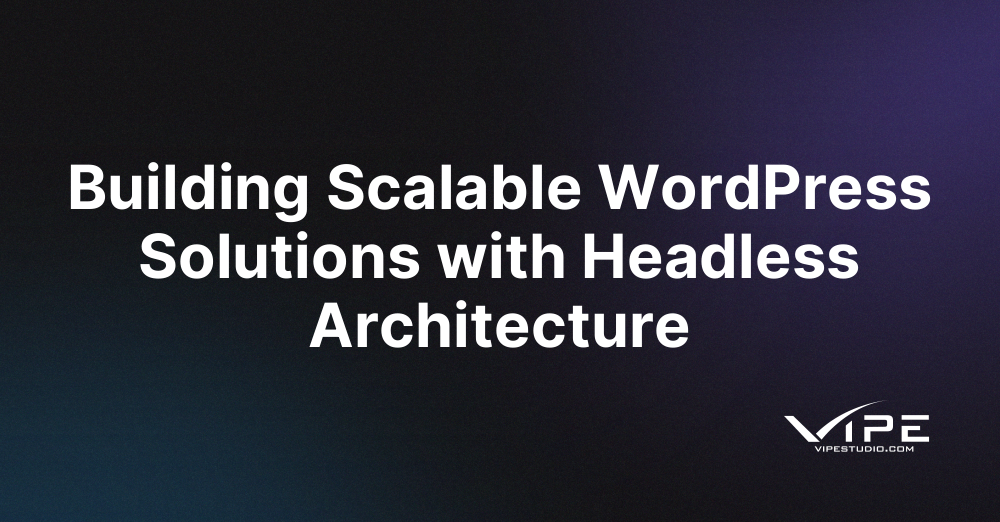10.01.2025
WordPress Development
Building Scalable WordPress Solutions with Headless Architecture
READING TIME: MIN
Table of Content
WordPress is traditionally known for its monolithic structure, where both the content management system (CMS) and front-end rendering are tightly integrated. However, with the rise of modern web development trends, enterprises are increasingly turning to headless WordPress architecture. In this article, we’ll explore how headless WordPress can help enterprises build scalable, flexible, and future-proof websites.
What is Headless WordPress and How Does It Work?
Headless WordPress refers to a decoupled approach where WordPress acts solely as a content management system, and the front-end presentation layer is handled separately. Instead of WordPress controlling both the backend and the front-end of the website, a headless setup separates the two. WordPress becomes an API-driven CMS that serves content to a front-end framework or application via RESTful APIs or GraphQL.
In a headless setup, WordPress manages the content, and other technologies—such as Next.js, React, or Vue.js—handle the rendering and user interface. This separation allows for greater flexibility in how content is presented across multiple platforms and devices, improving scalability and performance.
The Benefits of Headless WordPress for Enterprises
Headless WordPress offers several key benefits for enterprises looking to build modern, scalable websites:
- Scalability: By decoupling the front-end and back-end, enterprises can scale each component independently, ensuring that both the CMS and the front-end can handle high traffic and large amounts of content without affecting performance.
- Performance Optimization: Headless WordPress allows developers to use advanced front-end frameworks like Next.js, which offer features like server-side rendering (SSR) and static site generation (SSG) for fast loading speeds and improved user experience.
- Multi-Platform Delivery: With headless architecture, the content served by WordPress can be easily pushed to multiple platforms such as mobile apps, IoT devices, or even third-party websites. This enables enterprises to deliver a consistent experience across all channels.
- Flexibility and Customization: Headless WordPress allows developers to choose the best technologies for the front-end, giving them the flexibility to build highly customized, feature-rich websites that align with business needs.
This makes headless WordPress a perfect solution for enterprises looking to future-proof their digital presence while maintaining flexibility and performance.
Enhancing User Experience with Headless WordPress
One of the key advantages of headless WordPress is the ability to optimize the user experience (UX). By separating the back-end content management from the front-end presentation, enterprises can deliver highly interactive and personalized experiences to users:
- Custom Front-End Experiences: With full control over the front-end, enterprises can create unique and engaging user interfaces tailored to their brand and audience.
- Improved Mobile Experiences: Since headless WordPress allows content to be delivered to mobile applications or websites with optimized rendering, it improves the performance and experience on mobile devices, which is critical for today’s mobile-first users.
- Personalization: Headless architecture enables enterprises to deliver personalized content across channels based on user behavior, location, or preferences, enhancing engagement and conversion rates.
The ability to create tailored user experiences across different devices and touchpoints is one of the key reasons why enterprises are adopting headless WordPress as a go-to solution for their web development needs.
Optimizing SEO with Headless WordPress
Search engine optimization (SEO) is critical for the success of any enterprise website, and headless WordPress can help improve SEO performance in several ways:
- Faster Page Load Times: By leveraging modern front-end frameworks such as Next.js, headless WordPress can deliver lightning-fast page load times, which is a crucial ranking factor for search engines like Google.
- Server-Side Rendering (SSR): With SSR, content is rendered on the server before being sent to the client, ensuring that search engine crawlers can easily access and index the content of your pages.
- Static Site Generation (SSG): Headless WordPress allows for static site generation, where HTML files are pre-built and served to users, leading to faster load times and improved SEO.
These performance optimizations enhance the user experience while boosting your website’s search engine ranking, making headless WordPress an ideal choice for SEO-focused enterprise websites.
Why Choose Vipe Studio for Your Headless WordPress Development?
At Vipe Studio, we specialize in building scalable WordPress solutions using headless architecture. Our team of experienced developers can help you create a flexible and performance-optimized website that delivers seamless experiences across multiple platforms.
Our services include:
- Headless WordPress setup and customization.
- Integration with modern front-end frameworks like Next.js and React.
- API integration for multi-platform content delivery.
- SEO optimization for headless WordPress websites.
If you’re looking to scale your enterprise website and future-proof your digital presence, contact Vipe Studio today to explore how headless WordPress can transform your web development strategy.
Conclusion: Future-Proofing Your Enterprise with Headless WordPress
Headless WordPress is revolutionizing how enterprises approach web development by providing flexibility, scalability, and performance optimizations. By decoupling the content management system from the front-end, businesses can create modern, high-performance websites that deliver exceptional user experiences across multiple platforms. With the expertise of Vipe Studio, you can leverage headless WordPress to build a future-proof digital solution tailored to your business needs.
More on The Topic
- Navigating WooCommerce Performance: Real-World Strategies
- The Role of AI in WordPress Development Workflows
- Optimizing WordPress for Enterprise: Beyond Basic Caching
- WordPress and Headless Commerce: A Provocative Dilemma
- Decoupled WordPress Architecture: The Future or a Fad?
The content of this website is copyrighted and protected by Creative Commons 4.0.



